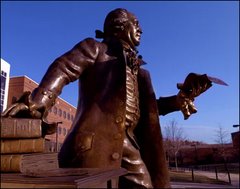 David Ricardo:
David Ricardo:David Ricardo (18th April, 1772–11th September, 1823), a political economist, is often credited with systematizing economics, and was one of the most influential of the classical economists, along with Thomas Malthus and Adam Smith. He was also a businessman, financier and speculator, and amassed a considerable fortune.*
Abstract:
As we go about our daily lives, it is easy to overlook the importance of international trade. Economists almost unanimously agree that the optimum benefits of international trade can only be achieved with free trade: trade without government intervention. Economists support the argument with a theory proposed by a prominent economist, David Ricardo, known as the theory of comparative advantage. While presenting the following research paper, the author makes the assumption that the reader has a clear understanding of the theory of comparative advantage. (Please see the paper titled “Explanation of the Theory of Comparative Advantage” in Appendix A) Next, the trade policies that were established prior to David Ricardo’s time would be stated and compared with that proposed by David Ricardo. Furthermore, the relationship between comparative advantage and free trade and specialization would be mentioned followed by a discussion on the economics gains from trade. Finally, the continuing influence of the theory of comparative advantage in modern economics and politics will be discussed. In essence, the research paper would focus on the influence of David Ricardo’s theory of comparative advantage by describing the relationship between the theory and free trade.
read entire article >>>>
Appendix A >>>>
Appendix B >>>>
* - Reference: Wikipedia

No comments:
Post a Comment